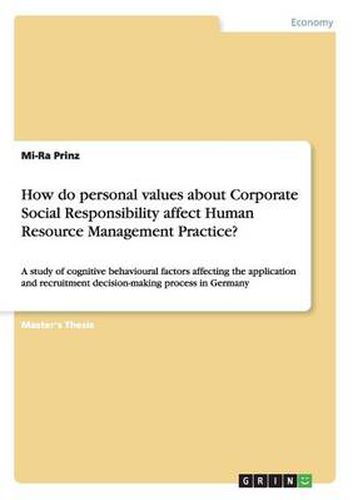Readings Newsletter
Become a Readings Member to make your shopping experience even easier.
Sign in or sign up for free!
You’re not far away from qualifying for FREE standard shipping within Australia
You’ve qualified for FREE standard shipping within Australia
The cart is loading…






Master’s Thesis from the year 2011 in the subject Business economics - Personnel and Organisation, grade: 72 (with distinction), Queen Mary University of London, course: International Human Resource Management, language: English, abstract: Abstract Little research has been conducted into corporate social responsibility and its implications for human resource management, in particular with regard to application and recruiting process. The study recognizes the importance of CSR in current management practice and strategy and examines the way in which personal values regarding CSR affect application and recruitment practices in Germany. To this end the study explores how individuals understand and define CSR and asks which factors influence this. Moreover, the findings show what role individual understandings of CSR play in the application and recruiting process. The research seeks to understand the external environment that decisions are taken within and thus highlights the impact of socio-economic context on personal values regarding CSR in general and in specific regarding the first point of contact between job applicant and targeted company. The theoretical lens applied makes use of Carroll s (1991) pyramid of CSR and Festinger s (1962) theory of cognitive dissonance. The study is qualitative and includes an analysis of 16 semi-structured interviews with business students and HR-managers working in companies in Germany. The results are used to present a complex and multifaceted model that reflects the variety of factors that should be taken into consideration during the application and recruiting process.
$9.00 standard shipping within Australia
FREE standard shipping within Australia for orders over $100.00
Express & International shipping calculated at checkout
Master’s Thesis from the year 2011 in the subject Business economics - Personnel and Organisation, grade: 72 (with distinction), Queen Mary University of London, course: International Human Resource Management, language: English, abstract: Abstract Little research has been conducted into corporate social responsibility and its implications for human resource management, in particular with regard to application and recruiting process. The study recognizes the importance of CSR in current management practice and strategy and examines the way in which personal values regarding CSR affect application and recruitment practices in Germany. To this end the study explores how individuals understand and define CSR and asks which factors influence this. Moreover, the findings show what role individual understandings of CSR play in the application and recruiting process. The research seeks to understand the external environment that decisions are taken within and thus highlights the impact of socio-economic context on personal values regarding CSR in general and in specific regarding the first point of contact between job applicant and targeted company. The theoretical lens applied makes use of Carroll s (1991) pyramid of CSR and Festinger s (1962) theory of cognitive dissonance. The study is qualitative and includes an analysis of 16 semi-structured interviews with business students and HR-managers working in companies in Germany. The results are used to present a complex and multifaceted model that reflects the variety of factors that should be taken into consideration during the application and recruiting process.